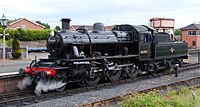LMS Ivatt Class 2 46443
Contents
46443 in service
The LMS Ivatt Class 2 was designed by H.G. (George) Ivatt for work on secondary and branch line duties. Locomotives of this class were often referred to as a "Mickey Mouse". It is a 2-6-0 'Mogul', rated 2MT by BR following nationalisation. The design of the BR Standard class 2 2-6-0 closely followed the Ivatt Class 2 design.
46443 was built at BR’s Crewe works in April 1950 and was based at Derby for 11 years. In 1951 46443 moved to Saltley, where duties were limited to infrequent rush hour journeys. A final move to Newton Heath (near Manchester) in 1966 was followed by withdrawal in March 1967.
46443 in preservation
46443 was purchased from BR by Richard Willcox in 1967, and was the second engine to arrive on the Severn Valley Railway, arriving under its own steam on 22nd April that year.[1] The SVR bought the locomotive in 1972, but announced in 1983 that the locomotive had been sold as part of the deal that brought 45690 Leander to the SVR, and would be leaving the following year. A fund was launched to 'buy back' the locomotive, during which time it gained the nickname 'The Peoples Engine', and 46443 never left the SVR. It is now owned by The SVR 46443 Fund. A part of the successful fund-raising entailed the sale of T-shirts emblazoned with the phrase "46443 The Peoples Engine".
Although only a Class 2 locomotive, 46443 has fully earned a place in the list of SVR locomotives that have worked on the main line. During the 1985 GWR 150 celebrations 46443 hauled a number of Bristol-Portishead shuttles. In July 1987, 46443 was asked to punch well above her weight when sent to Wales to replace Class 4MT 75069 on the BR Cardigan Bay Express service. On arrival, the BR footplate crews expressed the opinion that they would be "creeping around with three coaches at 20 mph!'. The first on-time arrival at Barmouth brought forth the comment "She steams quite well, doesn't she!". An early return to Machynlleth gave rise to "She isn't a bad little engine, is she!". Within two days, "I'd take ten to Pwllheli with her anytime!".
A regular at the SVR ever since, 46443 had covered 145,997 miles in preservation when withdrawn from service in October 2011. It is now on display in The Engine House awaiting its next overhaul.
46443 features on the pub sign of The Railwayman's Arms at Bridgnorth.
Sources
Past editions of SVR News
Information display board in The Engine House
See also
List of Locomotives on the SVR
- ↑ A G Cleaver, "The Early Days Of The 'Severn Valley'", SVR News 190 (2015) p19.
